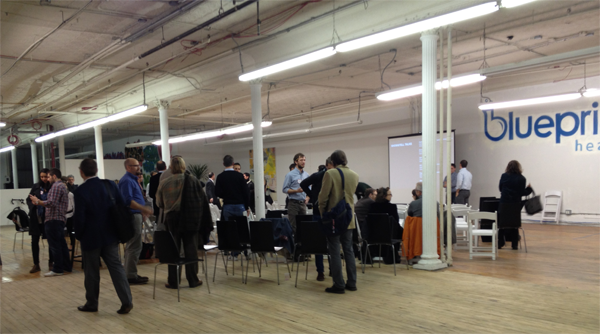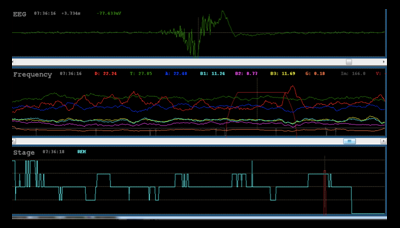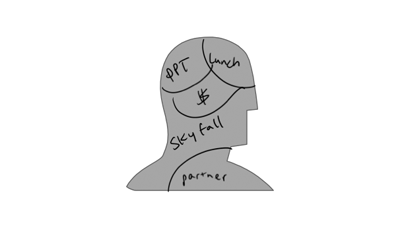New York QS Show and Tell #18 Recap
Steven Dean
December 6, 2012

We had a great turnout at our last meetup in New York hosted at startup accelerator program Blueprint Health in Soho. Thank you to my co-organizers, Patrick Whitaker and Andrew Paulus , who helped pull together this recap. And thank you to the rest of my co-organizers Brian Gallegos, Mark Brooks and Konstantin Augemberg for helping out with another fascinating evening of demo and show&tell talks.
Demo Hour
Our latest demo hour included five presenters with concepts ranging from behavior change to respiratory training. QS attendees mingled around tables and engaged in interactive discussions with five demonstrators, who had come to present some interesting and diverse initiatives.
Susan Alexander from app4Mind presented a mental model she created for behavior modification. Susan was inspired by her own experience, those of others, and the world’s wealth of research on change, growth, and how to change behavior. The model distills all of this down to four memorable principles, each word beginning with the letter M. Together, they serve as a “mind app” which she presented in illustrated form. Susan is planning to launch a new website by year’s end to serve as a platform for app4Mind.
Matt Stanfield demonstrated BagIQ, a platform he is developing to give people product-level purchase data and insight into spending habits. BagIQ renders detailed product-by-product, dollar-by-dollar analysis, and presents them in simple, digestible ways. The power is in taking that product level data and connecting it to personally relevant 3rd party data specific to each user’s health, diet, ethics, shopping. Matt’s demo culminated with sweeping discussions about potential applications and insights that could be derived from the data and it will be interesting to see how BagIQ develops.
Melody Wilding presented eCaring, a care management system that seeks to generate comprehensive, real-time behavioral & clinical data from a patient’s home. eCaring was developed to enable hospitals, healthcare providers & families to track & respond to conditions, making early intervention possible, reducing hospital readmissions, lowering care costs, & improving care quality for seniors & people with chronic conditions. eCaring currently has several programs underway with hospitals & for long term care management.
Anthony Ina demonstrated a prototype of HealthBoard, which was developed to allow active duty military personnel the ability to interact with their own personal health information and electronic medical records, and to offer healthcare providers better access to patients and their decisions. By integrating information design principles, HealthBoard seeks provides users with enhanced and streamlined access to information, making it less intimidating and easier to understand the impacts of decisions on health outcomes.
Bez Arkush demonstrated a device that can measure inspiratory and expiratory breathing. Different resistance levels support breathing measurements and exercises to be used in respiratory therapy and respiratory sport training. The device connects with iPads and creates a game-like environment while keeping track of your activity.
Show&Tell Talks
Following demo hour, we had six show&tell talks on guitar playing, lucid dreaming, salt sensitivity, exercise, headaches and the unconscious.
Exploring the Sleep Frontier – Lucid Dreaming with the Zeo
 The evening started with Dave Comeau, a lucid dreaming enthusiast who described his experiments hacking the Zeo to help trigger lucid dreams. Although Dave had been experimenting with lucid dreaming for many years, the launch of the Zeo Sleep Manager gave him fresh insight into his sleeping patterns, specifically about when he entered the REM sleep states most conducive to lucid dreaming. Dave introduced resources like Zeoscope and Sleep Stream Online and told of his experiments using the Zeo extensions to trigger visual and auditory cues with hopes of inducing lucid dreaming, although they often backfired by waking him up. Following the presentation, there was an interactive Q&A in which the potential of other sensory cues was discussed (e.g. olfactory or gustatory cues like using X10 to trigger a Glade PlugIn). When asked what drew him to lucid dreaming, Dave said “I don’t know what the benefits of those are — except being awesome!”
The evening started with Dave Comeau, a lucid dreaming enthusiast who described his experiments hacking the Zeo to help trigger lucid dreams. Although Dave had been experimenting with lucid dreaming for many years, the launch of the Zeo Sleep Manager gave him fresh insight into his sleeping patterns, specifically about when he entered the REM sleep states most conducive to lucid dreaming. Dave introduced resources like Zeoscope and Sleep Stream Online and told of his experiments using the Zeo extensions to trigger visual and auditory cues with hopes of inducing lucid dreaming, although they often backfired by waking him up. Following the presentation, there was an interactive Q&A in which the potential of other sensory cues was discussed (e.g. olfactory or gustatory cues like using X10 to trigger a Glade PlugIn). When asked what drew him to lucid dreaming, Dave said “I don’t know what the benefits of those are — except being awesome!”
Exercise and Consumption
 The next talk was by Emily Chambliss, who had completed several months of tracking her consumption and exercise in a comprehensive, color-coded spreadsheet. When asked about the motivation behind this effort, Emily noted that she didn’t trust her own perceptions, which is why she needed to start tracking. Informed by her nutrition and activity tracking, Emily was able to strategize, set goals, and implement greater levels of self discipline into her daily life. Over time she learned that her behavior was surprisingly predictable, and clear insights emerged about her self-described “lack of discipline on weekends.” In response to audience questions about the scope and challenges of her tracking project, Emily clarified that she tracked “everything — including booze, which was painful” and was quick to note that “a shot of whiskey has 64 Calories, according to most sources.”
The next talk was by Emily Chambliss, who had completed several months of tracking her consumption and exercise in a comprehensive, color-coded spreadsheet. When asked about the motivation behind this effort, Emily noted that she didn’t trust her own perceptions, which is why she needed to start tracking. Informed by her nutrition and activity tracking, Emily was able to strategize, set goals, and implement greater levels of self discipline into her daily life. Over time she learned that her behavior was surprisingly predictable, and clear insights emerged about her self-described “lack of discipline on weekends.” In response to audience questions about the scope and challenges of her tracking project, Emily clarified that she tracked “everything — including booze, which was painful” and was quick to note that “a shot of whiskey has 64 Calories, according to most sources.”
Salt Sensitivity
 Midway through the evening, we heard from Greg Pomerantz on a self experiment he had conducted on salt sensitivity. Greg noted that health authorities generally recommend salt restriction, which is controversial since people have varying levels of sensitivity to salt that cannot be addressed by blanket advice. Greg raised one of the challenges that “you need IRB approval when you do experiments on humans — except, you know, when you do it on yourself.” Thus empowered with the administrative freedom of n=1 self-experimentation, Greg weighed himself every morning and deliberately varied his salt intake through three phases over a period of several weeks. Although Greg had conceived this experiment since his blood pressure was at the higher end of the normal range, he was surprised by his findings that he was not particularly sensitive to salt, and moreover that the only adverse consequences he experienced (e.g., impair thermoregulation) seemed to be caused by insufficient salt consumption. Since his experiment, Greg has made a point to add more salt to his meals to ensure sufficient levels of consumption. When asked if he had talked to his primary care physician about this, Greg smiled and said, “not yet, but I’m sure he would be interested.”
Midway through the evening, we heard from Greg Pomerantz on a self experiment he had conducted on salt sensitivity. Greg noted that health authorities generally recommend salt restriction, which is controversial since people have varying levels of sensitivity to salt that cannot be addressed by blanket advice. Greg raised one of the challenges that “you need IRB approval when you do experiments on humans — except, you know, when you do it on yourself.” Thus empowered with the administrative freedom of n=1 self-experimentation, Greg weighed himself every morning and deliberately varied his salt intake through three phases over a period of several weeks. Although Greg had conceived this experiment since his blood pressure was at the higher end of the normal range, he was surprised by his findings that he was not particularly sensitive to salt, and moreover that the only adverse consequences he experienced (e.g., impair thermoregulation) seemed to be caused by insufficient salt consumption. Since his experiment, Greg has made a point to add more salt to his meals to ensure sufficient levels of consumption. When asked if he had talked to his primary care physician about this, Greg smiled and said, “not yet, but I’m sure he would be interested.”
200 Hours of Guitar Practice in a Year
 Jake Jenkins had always wanted to play the guitar, and he told an impressive story of pursuing this goal with the help of commitment devices and Beeminder. Based on his prior experiences learning kite surfing, indoor rock climbing, and downhill skiing, Jake estimated he would need to spend 400 hours deliberately practicing the guitar to be “good enough” and set a goal of practicing for 35 minutes every day for two years. After mixed results and missed practice sessions at the beginning, Jake grew interested in commitment devices and discovered the website Beeminder.com, which helped hold him accountable on a daily basis and achieve remarkable consistency with his guitar practice. Although Jake said at the outset that “[he] would classify[himself] as without rhythm,” he has been continuously improving through one year and 200 hours of guitar practice, which is evident by the videos he posts on YouTube every few months to show himself playing. Although Jake found self-tracking to be a powerful motivator, he learned that it isn’t always enough and can sometimes use the assistance of external commitment devices to stay on track. Jake’s talk was a compelling example of using QS concepts to motivate and manage his efforts to develop a challenging new skill.
Jake Jenkins had always wanted to play the guitar, and he told an impressive story of pursuing this goal with the help of commitment devices and Beeminder. Based on his prior experiences learning kite surfing, indoor rock climbing, and downhill skiing, Jake estimated he would need to spend 400 hours deliberately practicing the guitar to be “good enough” and set a goal of practicing for 35 minutes every day for two years. After mixed results and missed practice sessions at the beginning, Jake grew interested in commitment devices and discovered the website Beeminder.com, which helped hold him accountable on a daily basis and achieve remarkable consistency with his guitar practice. Although Jake said at the outset that “[he] would classify[himself] as without rhythm,” he has been continuously improving through one year and 200 hours of guitar practice, which is evident by the videos he posts on YouTube every few months to show himself playing. Although Jake found self-tracking to be a powerful motivator, he learned that it isn’t always enough and can sometimes use the assistance of external commitment devices to stay on track. Jake’s talk was a compelling example of using QS concepts to motivate and manage his efforts to develop a challenging new skill.
Figuring out a Headache’s Source
 The next presenter was Michael Wenger, who implemented a series of lifestyle experiments in response to some startlingly vague advice from a doctor. Prompted by chronic headaches, Michael had undergone an MRI which revealed a benign brain tumor. Extreme risks ruled out surgery as a viable option, so a physical simply recommended that Michael “make some lifestyle changes” to try to reduce the frequency and intensity of his headaches. With this sudden burst of motivation, Michael made some critical lifestyle changes including easing the pressure of academic overachieving by electing some pass/fail courses, improving his sleeping habits and eliminating all consumption of alcohol. Michael used various mobile apps to track relevant activities, and over the short term, Michael learned that the best remedy for an excruciating headache was “driving a car with the windows down while having a milkshake.” More importantly, Michael learned that “you can fix things” over the long term by tracking relevant measure to increase awareness of lifestyle choices and making changes to improve your condition.
The next presenter was Michael Wenger, who implemented a series of lifestyle experiments in response to some startlingly vague advice from a doctor. Prompted by chronic headaches, Michael had undergone an MRI which revealed a benign brain tumor. Extreme risks ruled out surgery as a viable option, so a physical simply recommended that Michael “make some lifestyle changes” to try to reduce the frequency and intensity of his headaches. With this sudden burst of motivation, Michael made some critical lifestyle changes including easing the pressure of academic overachieving by electing some pass/fail courses, improving his sleeping habits and eliminating all consumption of alcohol. Michael used various mobile apps to track relevant activities, and over the short term, Michael learned that the best remedy for an excruciating headache was “driving a car with the windows down while having a milkshake.” More importantly, Michael learned that “you can fix things” over the long term by tracking relevant measure to increase awareness of lifestyle choices and making changes to improve your condition.
Storyboarding the Psyche
 The final talk of the night was delivered by Cliff Atkinson, who started with the question of “how do you quantify the unconscious?” Interested in exploring such tendencies as procrastination in the context of knowledge about the unconscious developed by the early psychoanalysts, Cliff took a remarkably visual approach to his self tracking by tracking his body, emotions, and thinking through the creative use of iPhone apps, including Insight Timer and Penultimate. By importing clip art in the shape of a body and a head, Cliff created a template where he would visually annotate his feelings and observations each day, and he could zoom out in Penultimate to see many days at once and reflect on the visual storyboard of his tracking activities over time.
The final talk of the night was delivered by Cliff Atkinson, who started with the question of “how do you quantify the unconscious?” Interested in exploring such tendencies as procrastination in the context of knowledge about the unconscious developed by the early psychoanalysts, Cliff took a remarkably visual approach to his self tracking by tracking his body, emotions, and thinking through the creative use of iPhone apps, including Insight Timer and Penultimate. By importing clip art in the shape of a body and a head, Cliff created a template where he would visually annotate his feelings and observations each day, and he could zoom out in Penultimate to see many days at once and reflect on the visual storyboard of his tracking activities over time.


